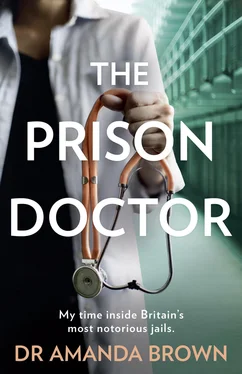I think it was intended to make GPs perform better, but I knew I’d struggle with it – gathering such information when perhaps a patient was deeply depressed or had recently been diagnosed with cancer, might feel inappropriate.
After twenty years my patients knew me too well. They would be able to see through why I was asking the questions, and I knew I couldn’t do it just for the sake of it.
I reflected on how things had changed in the two decades since I’d started the surgery from scratch. The practice was within easy reach of London, and I’d managed to build my list up to about four thousand patients.
I’d moved with the times, always adapting to the changes within the health system and my surgery, but this latest scheme was threatening my core beliefs and principles concerning patient care. I was deeply concerned that I wouldn’t be able to change my consultation style and gather the information required to earn the bonus payments. I also had a terrible inkling that my practice partners would demand I do so.
At 1 p.m. I steeled myself for what was to come, grabbed my note book and pen, and headed along the corridor to the meeting room.
Pretty pictures of landscapes, seascapes and flowers lined my way. I’d worked hard over the years to remove the sterile feel a new-build can have, to create a welcoming environment where people could feel relaxed. Small touches like that mattered to me.
I was the first to arrive.
I sat down to wait for the practice manager and my two partners, who now co-owned a share of the surgery. They were both excellent doctors, young and ambitious, and as I had never been particularly good at managing money or the business side of running the practice, I was more than happy to let them take charge.
The door swung open. Rohit, one of my GP partners, walked in, rubbing his hands. The other two followed close behind. They took their seats.
The tension was palpable. I sat there, legs crossed, anxiety building. My heart was pounding and I felt sick.
Rohit looked directly at me. ‘So, how are you feeling about the changes, Amanda?’ he asked.
We both had strong personalities and didn’t always see eye to eye.
I leant forward, crossing my arms on the table. My shirt tightened across my back, absurdly making me feel even more trapped.
Rohit leant back, giving me a tight little smile.
‘Well . . .’ I started, and didn’t stop until I’d expressed how unhappy I felt about the new scheme. I was open and honest with them about what I was – and, most importantly, wasn’t – prepared to do.
They glanced sideways at each other.
We were all silent for a while.
Rohit cleared his throat. ‘Well, if you don’t pull your weight financially, we will resent you,’ he said in an icy tone.
I felt like the wind had been punched out of my lungs.
Resent me ? I was the one who had built up the practice!
I felt furious. Unappreciated. But most of all, hurt.
Resent me ? To be made to feel so worthless, to be expected to live with their resentment, or toe the line to make more money . . .
I couldn’t work like this. I wouldn’t work like this.
It was my Sliding Doors moment. In the blink of an eye, my life took an unexpected turn.
‘Well, I’m leaving then,’ I said.
All three stared at me in disbelief as I slowly peeled myself out of my chair and walked out of the door.
I must have looked white as a ghost, as Kirsty on reception asked if I was all right.
‘No, I’m leaving.’ I choked back tears.
I heard her gasp, but whatever words followed were lost as I walked through the front doors, out into the cold. The wintery air hit my lungs, making it even harder to breathe.
What was I going to do now? I was forty-nine and turning my back on my career, my income, on everything .
I spun around and stared at the surgery I had created from nothing all those years ago. With it’s pretty rhododendron hedge that I’d planted to give it a more welcoming, community feel. The building my property developer husband, David, had built for me. I thought about the thousands of patients on my list, many of whom had become like friends. I’d watched their children grow up, I’d listened to them when they worried, seen some make huge life changes. I’d held the hands of heartbroken elderly patients as they cried with loneliness. I hadn’t been just a doctor: at times I felt as if I’d been a counsellor, a social worker, a vicar, a friend, all rolled into one. I had loved my life as a village GP, and over the years I had grown to know and love so many of the people I cared for that I used to joke I could write a book on many of them. Apart from my family, my surgery had been the most important thing in my life.
And just like that, it was all over.
*
I couldn’t sleep.
I’d been staring at the same spot on the ceiling for hours. David held my hand while I lay there, chewing over my decision. My husband, my boys – Rob and Charlie – they were everything to me. Doing something that lurched us into financial risk wasn’t something that sat well.
David had reassured me it would be okay. Luckily he had a good job and would be able to take care of us. I wasn’t used to someone taking care of me though. Ever since I was a little girl I’d wanted to stand on my own two feet. I loved working, it gave me a purpose, I didn’t want to give that up. I also loved helping people, that’s why I became a doctor. My thoughts went back to my patients. I felt a huge pang of guilt for walking away from them.
Guilt, fear, sadness, anger – a cocktail of emotions were turning and churning around in my mind, growing louder and more intrusive in the quiet of the night, until I finally snapped.
I peeled back the duvet, tiptoed across the room and slipped into my thick fleece dressing gown that was hanging from the hook on the back of the door. The cold fabric, chilled by the winter air, sent a shiver down my spine.
David stirred. ‘Are you okay?’
‘I’m fine, go back to sleep.’
Downstairs, I made myself a cup of warmed milk. I took a seat at our chunky wooden table and stared through the kitchen windows into the night. The infinity of black felt as dark as my future.
I didn’t have a formal agreement with my partners about my notice period. We had agreed I would leave the surgery in just three weeks’ time.
Leave my surgery – those words stoked my anger again. I didn’t feel it was right! GPs shouldn’t be getting paid bonuses for doing their jobs!
I took another furious slurp from my mug.
My partners had also been keen that I keep appointment times to ten minutes, and only address one problem in that time. But often my patients had been waiting weeks to see me, and if they came in with more than one problem I didn’t have the heart to tell them they would have to book another appointment, that they would have to wait another three weeks to tell me the rest of what was bothering them. More importantly, one ailment could be related to another; it was important to hear the full story.
I felt more indignant than ever.
I stared through the kitchen window again. But this time I looked past the darkness to see my own reflection.
My hair, short as it was, had managed to find entirely absurd, startled shapes. I flattened it down the best I could with my hand, and swept my fringe from my eyes.
I looked utterly exhausted but I knew I wouldn’t be able to get back to sleep until I had got everything off my chest.
I made my way to the study.
I didn’t need to switch the light on, the moon was beaming through the large sash windows, illuminating the cluttered room.
The shelves were so packed with medical journals they were warping under the weight, sinking in the middle like a hammock. The desk which overlooked the garden wasn’t much better. Either side of the computer were mountains of paperwork. The weight of a life, mountains and mountains of paper, and I was throwing it all away.
Читать дальше












